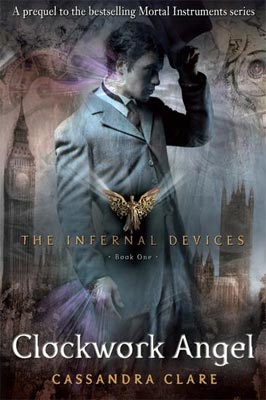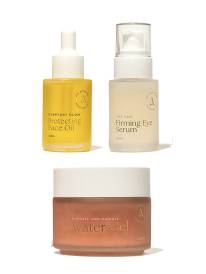The Infernal Devices Clockwork Angel

The Infernal Devices Clockwork Angel
The Infernal Devices trilogy, a prequel to the bestselling The Mortal Instruments trilogy, follows 16-year-old orphan Tessa Fell, whose quiet life is thrown into turmoil when her older brother Nathaniel suddenly vanishes, leaving her alone. Tessa's search for him leads her to England during the reign of Queen Victoria, into London's dangerous underworld, where warlocks throw masked balls for half-demon Downworlders and vampires and supernatural folk stalk the gaslit streets. When the friendless and hunted Tessa discovers that she herself is a Downworlder, she must learn to trust her natural enemies, the demon-killing Shadowhunters, if she ever wants to learn to control her powers and find her brother.
Drawn ever deeper into their world, she finds herself fascinated by - and torn between - two best friends; beautiful Will, a Shadowhunter hiding a deadly secret, and the devoted Jem, whose addiction to a demon drug is slowly destroying him. Tessa quickly realises that love may be the most dangerous magic of all and must draw on all her strength to save her brother and keep herself alive in this deadly new world.
Return to the world of the shadowhunters
The new fantasy full of vampires, werewolves and shape-shifters from New York Times bestselling author Cassandra Clare.
Cassandra Clare lives in Boston, USA. She has worked as an entertainment journalist for The Hollywood Reporter and has published several short stories and is the author of the popular internet parody The Very Secret Diaries. The Infernal Devices is her second major series.
The Infernal Devices Clockwork Angel
Walker Books
Author: Cassandra Clare
Price: $24.95
Interview with Cassandra Clare
Why did you choose to go back in time to place Victorian London as the setting for your new series?
Cassandra Clare: I've always been fascinated with the Victorian period. I intentionally set it toward the late middle Victorian period, a time of huge industrial expansion - a time when technology and industry were almost outrunning the ability of society to keep up with them. A time when London was choking under a haze of smog and dirt and factory smoke, because it parallels the sudden leap forward the Shadowhunters have made with their Accords, and the clash between tradition and modernity that they are experiencing.
What research did you do for the Victorian setting?
Cassandra Clare: For six months I read only books written during, or written about, the Victorian period. I did a lot of reading of first-hand sources: journals kept at the time period, the travel accounts of tourists visiting England from America (since Tessa is American, in London for the first time) and newspapers of the period. I also employed a research assistant - Lisa Gold - to track down hard to find photographs of locations in the time period, and went to London several times myself to map out routes and select locations.
Who's your favourite character in Clockwork Angel?
Cassandra Clare: For me picking a favourite character is like picking a favourite child - I can't do it! I loved writing Will, because Will is the kind of character I love reading about: he seems like he's one thing, but he's really something else entirely. Jem I love because he has such a good heart and Tessa was a lot of fun to write because she's so spirited and determined. And I always enjoy writing Magnus Bane so was happy he returned in this novel.
Describe Tessa's characterisation for us. Do you think Clary fans will embrace their new 'heroine'?
Cassandra Clare: So far the reaction has been very positive. Clary and Tessa share a strong, determined spirit but both are products of their time. Clary's far more willing to initially physically fight back against supernatural attackers, while Tessa has to wrestle with the idea that it's not in a woman's "nature" to be violent or even to comprehend violence. Tessa is more soft-spoken than Clary because at the time it was absolutely drilled into women's heads that they needed to be polite, sweet, reserved, and gentle in their speech - but they were allowed to be witty, so while she isn't as blunt or sarcastic as Clary, I like to think she verbally holds her own against the boys. On the other hand, Tessa, unlike Clary, is an enormous bookworm who lives out all her fantasies in books, which I think is something that book-lovers find easy to connect to.
Will Magnus Bane (a favourite warlock from the MI series) be playing a larger role in the new series?
Cassandra Clare: Yes, in the sense that we're going to see a lot of Magnus and we're going to see some of the forces that shaped him and made him what he is in The Mortal Instruments. He starts off the series in the middle of a love affair going pretty badly, and has a distrust and dislike of Shadowhunters. Once he's entangled in the lives of Will, Tessa and Jem he starts to see them differently and the echoes of his relationships with them resound down to his life in the present day.
Can we look forward to the intrigue and drama of another thrilling love triangle?
Cassandra Clare: In many ways I think of this as the first real love triangle I've gotten to write. I think in The Mortal Instruments it was always very clear who Clary was in love with; she just couldn't be with him. In Infernal Devices Tessa's feelings are much more complicated. There are things she loves about Will, and things she loves about Jem. To complicate matters further, the boys are best friends, and incapable of wanting to hurt each other. They're not so much fighting over Tessa as scrambling to get out of each other's way, to be the noble one who steps aside. But since both are hiding secrets - and since of course the final choice is Tessa's - there's no way someone's heart isn't going to get broken.
Will is an intriguing character - does he bear any relation to Jace? (from The Mortal Instruments)
Cassandra Clare: They're blood relatives. Will is Jace's ancestor. So they do have a lot in common - they use arrogance and humour to deflect seriousness and minimise emotional pain. They don't look at all alike (aside from both being handsome!) and Will is carrying around a secret that is just nothing like Jace has ever experienced. It actually makes him very different from Jace, but we don't find out the full extent of his secret until Book Two.
Where did you get the idea for tattoos to have magical powers?
Cassandra Clare: In a tattoo shop! I was with a friend of mine who worked in a tattoo shop in the East Village in NY. I was looking through the flash book - that's the book of art that a tattoo artist has designed - and hers were based on ancient runes. That's when I got this idea about skin runes that offered protection against demons and how neat that would be.
There's a lot of dialogue about the Accords - they seem to take on more significance in this series than in The Mortal Instruments?
Cassandra Clare: That's because in The Mortal Instruments the Accords have been around for a hundred years, while in the ID books they're new. The Accords are a fact of life for the Shadowhunters in MI, but in ID they've changed everything - the new generation is embracing them, but the older generation of Shadowhunters hates them. In fact, the older generation of Downworlders doesn't like them all that much. You can draw a parallel with any sort of progressive civil rights movement - it usually takes people a while to catch up and do the right thing.
What do you think makes your books so compelling for adolescent (and older!) readers?
Cassandra Clare: I think right now we're seeing a real boom in fantasy and a lot of rich and compelling storytelling coming out of that. I think that fantasy has that special opportunity to be universally compelling because it's so allegorical - people of any age can draw parallels with their own lives, because fantasy tends to touch on broad and accessible themes and concepts - coming of age, the choice between doing what's right and what's easy, deciding what kind of person you want to be, the connections of love and family. Teenagers can relate to the characters because they are like them, and adults can relate to the characters because who can forget what it was like to be a teenager? Who can forget their first love, first big life-changing decision, first realisation that they're becoming an adult? These things are meaningful for everyone.
In The Mortal Instruments Clary was a Shadowhunter, yet in Clockwork Angel Tessa is half human, half demon - does this mean the new Infernal Devices series will focus more on the world of the Downworlders?
Cassandra Clare: I think we get to hear more from the Downworlders about their perspective on Shadowhunters - we get to see the Shadowhunters from outside instead of inside and get a kind of glimpse of how scary they are! Also they treat Tessa very differently than they treated Clary, who was one of their own. Tessa has to struggle with feeling like she doesn't belong in the world of humans, doesn't belong in the world of Shadowhunters, yet has no idea what she'd do in the world of Downworlders either, since she was brought up believing she was human.
'Shapeshifting' - quite a cool ability! If you could change into anyone you wanted to, who would you change into and why?
Cassandra Clare: I deliberately didn't give Tessa the power of changing into animals or inanimate objects - it has to be another human being - because I didn't want her to have a power so strong it gave her easy outs from tough situations. Because if it were up to me, I'd totally pick animal shapeshifting - I've always wanted to fly so I'd kick it as a bird for a while.
You are writing more of The Mortal Instruments series. (yay!) Is there potential for The Infernal Devices to extend beyond three books, or will Tessa, Will and Jem's journeys end there?
Cassandra Clare: No one will believe me now, but I entirely intend for the books to end at Book Three - I'm already planning the epilogue where we find out what happens to everyone! I figure once you've written an epilogue, you can't ever go back.
You used to write for pop culture magazines - how was that?
Cassandra Clare: Really exhausting actually - we had these very weird hours because most of the day was just sitting around waiting for tips, news or gossip to come in from the West Coast which was three hours behind us. By the time we had stories to be written it would be 6pm and then they'd often have to be shipped out that night. It wasn't unusual to have a workday that went from noon to 3.00 in the morning.
Your blog suggests you may have a shoe fetish! Do you have any recent fab fashion tips or shoe news you want to share?
Cassandra Clare: I discovered the most fabulous shoe store while in London doing research. It's called Irregular Choice and the shoes are works of art. I mean just look at these!
MORE





